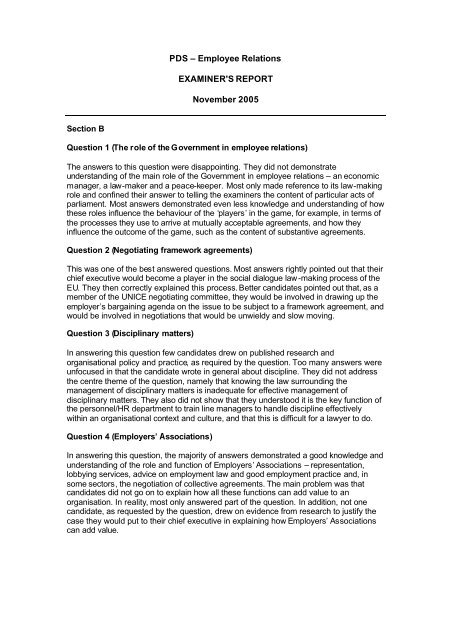Employee Relations November 2005 - CIPD
Employee Relations November 2005 - CIPD
Employee Relations November 2005 - CIPD
Create successful ePaper yourself
Turn your PDF publications into a flip-book with our unique Google optimized e-Paper software.
PDS – <strong>Employee</strong> <strong>Relations</strong><br />
EXAMINER'S REPORT<br />
<strong>November</strong> <strong>2005</strong><br />
Section B<br />
Question 1 (The role of the G overnment in employee relations)<br />
The answers to this question were disappointing. They did not demonstrate<br />
understanding of the main role of the Government in employee relations – an economic<br />
manager, a law-maker and a peace-keeper. Most only made reference to its law-making<br />
role and confined their answer to telling the examiners the content of particular acts of<br />
parliament. Most answers demonstrated even less knowledge and understanding of how<br />
these roles influence the behaviour of the ‘players’ in the game, for example, in terms of<br />
the processes they use to arrive at mutually acceptable agreements, and how they<br />
influence the outcome of the game, such as the content of substantive agreements.<br />
Question 2 (Negotiating framework agreements)<br />
This was one of the best answered questions. Most answers rightly pointed out that their<br />
chief executive would become a player in the social dialogue law-making process of the<br />
EU. They then correctly explained this process. Better candidates pointed out that, as a<br />
member of the UNICE negotiating committee, they would be involved in drawing up the<br />
employer’s bargaining agenda on the issue to be subject to a framework agreement, and<br />
would be involved in negotiations that would be unwieldy and slow moving.<br />
Question 3 (Disciplinary matters)<br />
In answering this question few candidates drew on published research and<br />
organisational policy and practice, as required by the question. Too many answers were<br />
unfocused in that the candidate wrote in general about discipline. They did not address<br />
the centre theme of the question, namely that knowing the law surrounding the<br />
management of disciplinary matters is inadequate for effective management of<br />
disciplinary matters. They also did not show that they understood it is the key function of<br />
the personnel/HR department to train line managers to handle discipline effectively<br />
within an organisational context and culture, and that this is difficult for a lawyer to do.<br />
Question 4 (Employers’ Associations)<br />
In answering this question, the majority of answers demonstrated a good knowledge and<br />
understanding of the role and function of Employers’ Associations – representation,<br />
lobbying services, advice on employment law and good employment practice and, in<br />
some sectors, the negotiation of collective agreements. The main problem was that<br />
candidates did not go on to explain how all these functions can add value to an<br />
organisation. In reality, most only answered part of the question. In addition, not one<br />
candidate, as requested by the question, drew on evidence from research to justify the<br />
case they would put to their chief executive in explaining how Employers’ Associations<br />
can add value.

















